
Millionaire Builds 99 “Tiny Homes” In Canada To Reduce Homelessness And “Empower” Residents
In a world where wealth often takes center stage, there are remarkable individuals who rise above the conventional paradigms of affluence to lead by example and harness their fortunes for the greater good.
Marcel LeBrun, a Canadian millionaire, has undertaken a remarkable initiative to address the issue of local homelessness by constructing 99 “tiny homes” in his hometown.
- Marcel LeBrun built 99 tiny homes in Canada to combat homelessness.
- $4 million was invested in creating the '12 Neighbours' micro home community.
- The project received $12 million in government grants for expansion.
- Tiny homes include a kitchen, bedroom, bathroom, porch, and solar panels.
A millionaire from New Brunswick tackled homelessness by constructing 99 tiny homes and building a gated community
Image credits: Marcel LeBrun
After selling his company for a substantial eight-figure sum, he consciously chose to allocate a portion of his wealth towards focusing on this pressing community concern.
In Fredericton, New Brunswick, Canada, a minimum of 1,800 individuals experienced homelessness for at least a day in the past year, as reported by the CBC.
In an effort to resolve the problem, Marcel allocated $4 million towards the development of what he refers to as the “12 Neighbours” which has been described as a “dignified micro home community”.
Image credits: marcelebrun
This innovative gated community is envisioned to encompass 99 compact homes, offering residents a space equipped with a kitchen, bedroom, and bathroom, complemented by a modest front porch and solar panels on the roof, even though the homes may not boast a vast amount of living space.
Having made substantial progress toward his goal of establishing 99 homes to combat homelessness, the 12 Neighbours community has also successfully obtained $12 million in government grants to facilitate the expansion of the project.
Marcel LeBrun sold his company for a substantial eight-figure sum
Image credits: marcelebrun
In a conversation with the Canadian broadcaster, Marcel elaborated on his motivation for this endeavor, shedding light on assembling the homes in a warehouse before placing them atop concrete blocks that serve as the building’s base.
“I see myself as a community builder, and really what we’re doing here is not just building a little community, but we’re building a community in a city, like how do we help our city be better?” he explained.
Image credits: CBC News: The National
The technology executive’s belief centers on the idea that providing individuals with their own property fosters a sense of responsibility and that a community comprising formerly homeless residents possesses an intimate understanding of the challenges faced by those still struggling.
Nonetheless, this project has not escaped its fair share of criticism, as some argue that homeless individuals would be better served by integration into society rather than residing in a gated community.
LeBrun invested $4 million in developing what he refers to as the “12 Neighbours” gated community
Image credits: CBC News: The National
In addition to the 99 homes, there have been ambitious plans for a community center, which will be managed as a resident-run business, featuring amenities such as coffee shops.
Moreover, the project has been envisioning a “teaching kitchen” and a silk printing business, where people can find employment opportunities.
The overarching goal has been to create a space that draws people from the wider community for a cup of coffee or to utilize the printing services.
Image credits: CBC News: The National
In recent years, as housing expenses have continued to soar, the concept of tiny homes has been gaining momentum as a potential remedy for homelessness, not only in Canada but also across the US.
Last month, the Governor of California, Gavin Newsom, unveiled his plan to position 300 tiny homes in Sacramento within the confines of an abandoned office park and the state fairgrounds.
The tiny homes are equipped with a kitchen, bedroom, and bathroom and complemented by a front porch and solar panels
Image credits: CBC News: The National
According to USA Today News, an additional 900 tiny homes were slated for placement on a designated piece of land in San Jose, as well as at yet-to-be-determined sites in Los Angeles and San Diego.
This visionary plan, which was initially disclosed in March, introduces structures that measure approximately 100 square feet, representing one of the most recent solutions to address the ongoing homeless crisis plaguing the US.
Image credits: CBC News: The National
Across the nation, local leaders have been grappling with the challenge of providing tens of thousands of homeless individuals with refuge, whether in homeless shelters, temporary hotel accommodations, or apartments funded through government vouchers.
However, the issue has been staggering in scope, with more than 580,000 Americans lacking adequate shelter, and roughly one-third of them residing in California.
These numbers have been continuing to swell, driven by a confluence of escalating evictions and steep rent hikes in thriving real estate markets, which have been relentlessly pushing more people into homelessness each day.
The 12 Neighbours is a “dignified micro home community”
Image credits: CBC News: The National
In the city of Angels, a substantial number of people experiencing homelessness have transitioned from the streets to tiny homes as a component of Mayor Karen Bass’ recent housing initiative.
Nonetheless, there have been concerns voiced by some individuals who have felt compelled to comply with certain conditions.
They have expressed reluctance due to the requirement of surrendering personal belongings, such as tents, prior to their relocation to a tiny home community.
Moreover, some have been obliged to share their living space with randomly assigned roommates, even leading to the separation of couples, as highlighted by Carla Orendorff, a homeless advocate.
“They call it housing pretty confidently, but once people are put into tiny homes, there aren’t many services that are being offered,” Carla said.
“They’re kind of being put in a waiting room,” she added.
The benevolent man believes that having a property will give people a sense of responsibility
Image credits: CBC News: The National
According to a paper written by a USC Annenberg Center for Health Journalism fellow, research conducted on tiny homes in Alameda County has shown that the community does not work for most participants because residents moving out of tiny homes failed to find permanent housing nearly three-quarters of the time between June 2019 and June 2022.
Additionally, the research also showed that people who lived in another tiny home area in Santa Clara County also failed to find permanent housing more than half of the time.
But tiny homes work better than traditional homeless shelters, the paper states.
“We’re building a community in a city,” Marcel said
Image credits: CBC News: The National
Residences at the most sizable dorm-style homeless shelters in these two counties frequently did not result in the attainment of permanent housing between 84% and 98% of the time.
While tiny homes generally provide a broader array of services compared to other shelter options, this enhanced level of support also comes at a substantially higher operational cost.
Image credits: CBC News: The National
Data has indicated that there are several strategies that tiny home programs can employ to increase their chances of achieving success, albeit at an elevated cost.
These strategies include establishing connections between residents and case workers and providing residents with access to private bathrooms.
Image credits: CBC News: The National
You can watch Marcel’s interview below:
Providing individuals with a greater timeframe to regain stability can also have a positive impact, as participants who extend their stay beyond six months demonstrate higher probabilities of transitioning into permanent housing.
Nevertheless, the majority of tiny home programs are structured with accommodations for stays lasting only between two to six months.
Many people admired Marcel’s generosity and “ethical use of wealth”
Poll Question
Thanks! Check out the results:
51Kviews
Share on FacebookExplore more of these tags
This is a wonderful thing, of course, but some of the comments embedded within this story are infuriating. Someone was worried that these people would be "better served by integration into society rather than residing in a gated community." B***h, is *anyone* doing anything else for these people right now? The best way for them to re-enter society is to have a safe roof over their head and a place to shower, to START. And the second bit of information is even more infuriating: "research conducted on tiny homes in Alameda County has shown that the community does not work for most participants because residents moving out of tiny homes failed to find permanent housing nearly three-quarters of the time between June 2019 and June 2022". No s**t! This study was conducted in California. NO ONE can afford to live there.
Also: how about rich folks already living in gated communities - should they be reintegrated into society by maybe living amongst those former homeless?
Load More Replies...There's even more people like him, people donating a majority of their wealth. The 50% league, for example, consists of rich people who donate at least 50% of their belongings to combat the dire situation the poor, even more so in less far developed countries, have to face. After all, I don't really see how anybody can be seriously rich - meaning, counting in millions and above, dollar, euro, some currency in that ballpark - and NOT contribute to at least on of the urgent problems we're facing. Nowadays, with China and Russia on one side, the so-called West on the other, there also will come into play that every country can only cooperate closely with either of them, but not both. If we take the so-called western values seriously, we gotta offer the better deal - more freedom, more wealth, and at least the outlook on an evener wealth distribution. The crippling lack thereof leaves millions of people outside of any hope, and ... well, freedom, democracy and human rights depend on a broad wealth distribution rather than absolute wealth, if the latter is concentrated on a few lucky ones only. We could overcome at least the worst poverty within a decade or so, all it takes is every rich person giving - giving BACK - their share, and the normal population not being left with extraordinary expensive options, or products stemming from some sort of sweatshop. Sweatshops are just slavery with the edges worn off a bit, nothing more and, considering absolute wealth and options of today, even more evil than any of it's predecessory atrocities.
This is a great initiative, Kudus to him. This is proof that the system is flawed, people with jobs are homeless. The cost of living has shot up over the last 30 years and wages have remained the same or less. In 1989 my rent was just under a third of my wage. In 2023 it is would be more then half my wage. I have friends that are lucky if the make 1400 euros month and pay 800 euros rent. Rents are going up stoked by Airbnb and speculation and it's getting harder and harder for families to cope.
This is a wonderful thing, of course, but some of the comments embedded within this story are infuriating. Someone was worried that these people would be "better served by integration into society rather than residing in a gated community." B***h, is *anyone* doing anything else for these people right now? The best way for them to re-enter society is to have a safe roof over their head and a place to shower, to START. And the second bit of information is even more infuriating: "research conducted on tiny homes in Alameda County has shown that the community does not work for most participants because residents moving out of tiny homes failed to find permanent housing nearly three-quarters of the time between June 2019 and June 2022". No s**t! This study was conducted in California. NO ONE can afford to live there.
Also: how about rich folks already living in gated communities - should they be reintegrated into society by maybe living amongst those former homeless?
Load More Replies...There's even more people like him, people donating a majority of their wealth. The 50% league, for example, consists of rich people who donate at least 50% of their belongings to combat the dire situation the poor, even more so in less far developed countries, have to face. After all, I don't really see how anybody can be seriously rich - meaning, counting in millions and above, dollar, euro, some currency in that ballpark - and NOT contribute to at least on of the urgent problems we're facing. Nowadays, with China and Russia on one side, the so-called West on the other, there also will come into play that every country can only cooperate closely with either of them, but not both. If we take the so-called western values seriously, we gotta offer the better deal - more freedom, more wealth, and at least the outlook on an evener wealth distribution. The crippling lack thereof leaves millions of people outside of any hope, and ... well, freedom, democracy and human rights depend on a broad wealth distribution rather than absolute wealth, if the latter is concentrated on a few lucky ones only. We could overcome at least the worst poverty within a decade or so, all it takes is every rich person giving - giving BACK - their share, and the normal population not being left with extraordinary expensive options, or products stemming from some sort of sweatshop. Sweatshops are just slavery with the edges worn off a bit, nothing more and, considering absolute wealth and options of today, even more evil than any of it's predecessory atrocities.
This is a great initiative, Kudus to him. This is proof that the system is flawed, people with jobs are homeless. The cost of living has shot up over the last 30 years and wages have remained the same or less. In 1989 my rent was just under a third of my wage. In 2023 it is would be more then half my wage. I have friends that are lucky if the make 1400 euros month and pay 800 euros rent. Rents are going up stoked by Airbnb and speculation and it's getting harder and harder for families to cope.

 Dark Mode
Dark Mode 

 No fees, cancel anytime
No fees, cancel anytime 









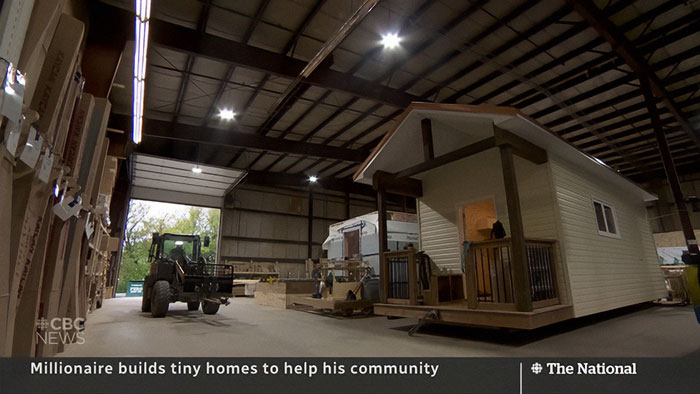

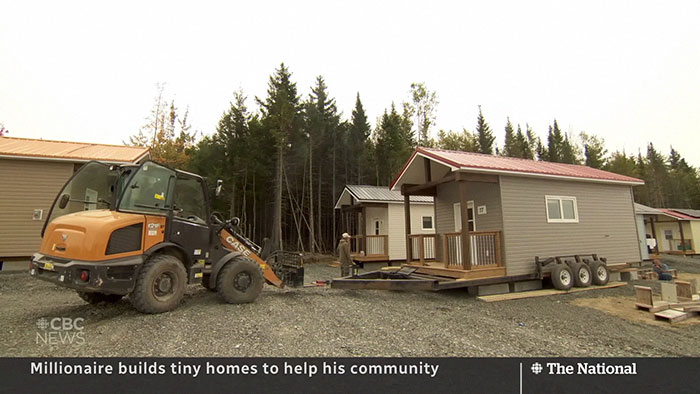
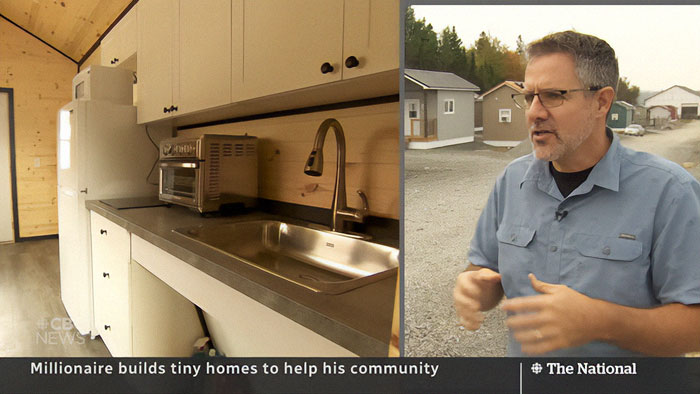

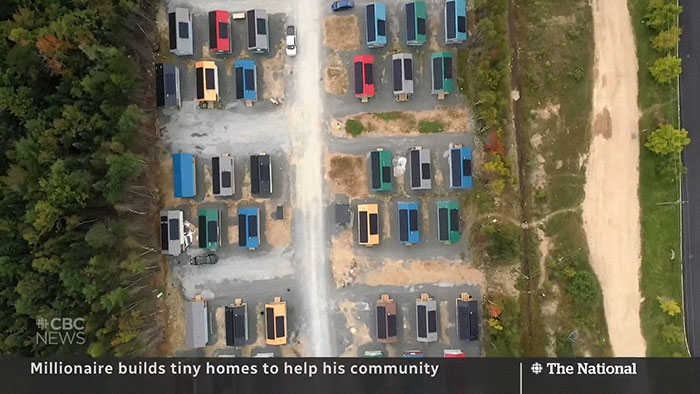
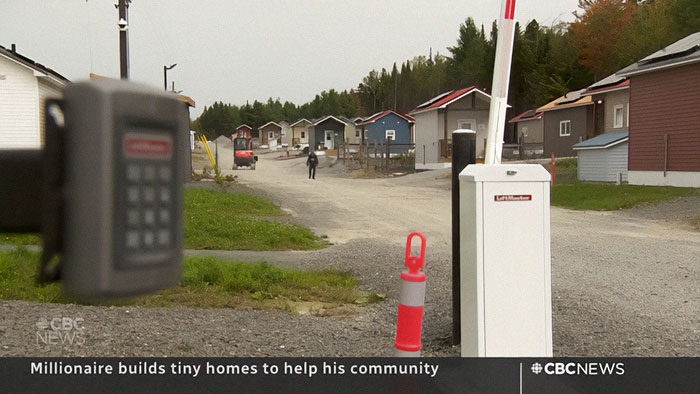





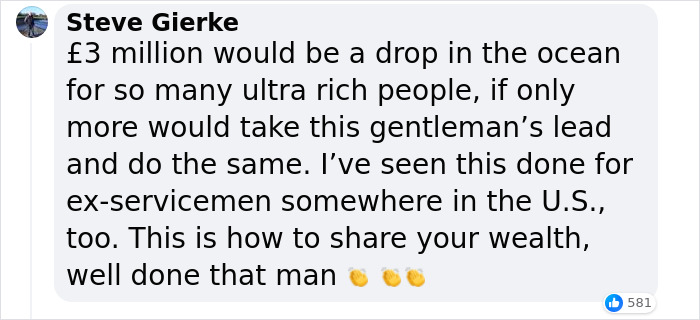























































132
21